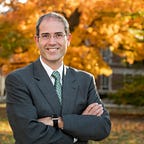Indicators of Excellence in the Liberal Arts
The following reflections are offered in the context of the opening colloquium of the College and Beyond II: Liberal Arts & Life series. #collegeandbeyondii
The current pandemic is an apocalypse — an uncovering. It reveals at once our irreducible interconnectedness and the deep disparities that demonstrate our complete failure to live up to the ideal of justice to which we profess to aspire.
Whether or not this apocalypse becomes a catastrophe — a down turning, a diminution of human potentiality — will depend in no small part on our ability to transform the education we offer into a catalyst for the creation of fulfilling lives within the context of a more just world.
An education in the arts of liberty, that is, a liberal arts eduction is designed to be just such a catalyst of personal fulfillment and communal well-being. It recognizes freedom not as a right bestowed, but as an activity undertaken. And like every activity, freedom can be practiced well or poorly. When practiced well, individuals and the commonweal thrive. When practiced poorly, societies collapse under the weight of vested interests and oppression.
Excellence in the arts of liberty involves the cultivation of certain ethical and civic virtues: the ability to communicate with eloquence, embrace diversity with grace, perceive…
